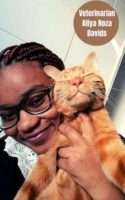Meet Aliya Roza Davids, a young South African veterinarian working in England.
When did you decide to become a veterinarian, and why?
I didn’t really have a large amount of exposure to the medical / veterinary industry growing up, but was always surrounded by animals and taught to love and value their companionship.
The honest answer is, I knew I wanted to pursue something in a biological/ scientific field. In my 11th Grade, I flipped through a university course catalogue and was intrigued by the veterinary faculty. I was drawn to it because it seemed particularly diverse – with many subfields.
Which school subjects did you require in order to study veterinary sciences?
The most important and essential are physics, mathematics, and English; and biology is recommended. My other high school subjects included an advanced programme in English literature, dramatic studies and a second additional language.
Where did you study and how long did the course take? Tell us a bit about that experience while studying.
I studied in South Africa. Currently there is only one faculty (Onderstepoort) at the University of Pretoria. It is world class institution and is internationally accredited. It’s a six-year course, and for me included a 7th year of working for the state in a new graduate programme.
The faculty is on its own campus in the north of Pretoria. It’s a large farm-type campus with beautiful scenery, and a teaching animal unit and hospital. My favourite part of being a student there was having a university experience while living on campus and thus being able to engage in social events and make some very important friendships along the way. I liked learning so many different subjects and having the opportunity to do practical training, and also enjoyed getting to know the staff members and campus workers.
The not good part was that the veterinary industry is not as diverse as one would think. Being a student my experience was that the space wasn’t demographically representative of the country at large. As a young BIPOC (Black/Brown Indigenous Person of Colour) it was very evident to me that the industry is still very white, male and patriarchal. The history of veterinary sciences in South Africa, pre-apartheid is very interesting but of course very niche, and the space was at one point only accessible to a certain demographic. Although transformation is happening, it is happening too slowly in my opinion. South Africa has the most unequal distribution of veterinary services countrywide.
Now that you are qualified, what is the best and worst thing about being a veterinarian (vet)?
Making a difference in the lives of people and pets is at the core of what draws me to this work. Whether it be working in a welfare clinic setting or in private practice, it is rewarding to be able to effect change; learn about cutting edge medical science; and see patients recover.
Travel opportunities are plentiful, with this kind of work – it’s in demand everywhere and anywhere. That being said, the most important thing to me, is giving back to the community and being able to service places in this world that need my skills the most.
The reality of this type of work is that it is physically and mentally draining. It’s incredibly easy to burn out and experience compassion fatigue in this field. Balancing mental health and wellness is essential in this industry.
You are currently based in England. What is it like being a young, newly qualified vet there?
It’s exciting being this new in the field. This is the kind of work that is constantly expanding and evolving. It’s been a challenge to work away from home but equally liberating. It’s a huge stepping stone and has helped me grow.
I’ve always prided myself on the fact that my education at Onderstepoort equipped me for real-life veterinary situations and I gained a lot of practical experience there that I now use as a consulting general practitioner.
What do you enjoy most and least about living in England/ the part of England where you are based?
I’m quite far north-east in England which isn’t the same experience as being in a big city like London or Manchester. I enjoy the physical space that I’m in though; being close to the ocean – albeit the cold North Sea.
The accessibility and public transport is phenomenal. Being young and new in a space totally foreign to me is exciting and comes with a lot of spontaneity, newness and potential.
Surprisingly the weather is one of my favourite parts. It’s fresh and cool and where I am geographically, relatively mild and pleasant.
My least favourite parts of living here were: adjusting and acclimatising; not having a large friend group to begin with; and dealing with being in a new space in the middle of a global pandemic.
What advice do you have for young people aspiring to become vets?
Go for it! It’s hard work but very rewarding. Don’t be afraid to make your voice heard in the industry. I’d encourage anyone with an interest in the medical field, and interests in intersections between environmental, human and animal sciences to pursue this career.
My takeaway message – it’s not always a glamorous job, but the field is so vast. It includes sub-fields relating to aquatic health, production health, domestic animals, epidemiology and laboratory work; it’s endless.
For young students: you don’t have to know exactly which career path you want to follow at the age of 18. There are so many ways to acquire skills; and you can do more than one thing.
Tell us: Do you think veterinarians are essential workers in communities?
If you enjoyed this article, you may also like Why you fear snakes here








